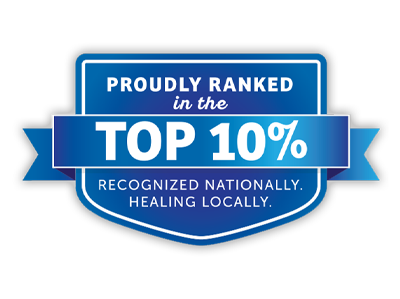No Surprise Billing
We provide specialized rehabilitative services to our patients in the communities we serve. We often see patients who are recovering from disabilities caused by injuries, illnesses, or chronic medical conditions.
Your Rights and Protections Against Surprise Medical Bills
When you get emergency care or get treated by an out-of-network provider at an in-network hospital or ambulatory surgical center, you are protected from surprise billing or balance billing.
What is “balance billing” (sometimes called “surprise billing”)?
When you see a doctor or other health care provider, you may owe certain out-of-pocket costs, such as a copayment, coinsurance, and/or a deductible. You may have other costs or have to pay the entire bill if you see a provider or visit a health care facility that isn’t in your health plan’s network.
“Out-of-network” describes providers and facilities that haven’t signed a contract with your health plan. Out-of-network providers may be permitted to bill you for the difference between what your plan agreed to pay and the full amount charged for a service. This is called “balance billing.” This amount is likely more than in-network costs for the same service and might not count toward your annual out-of-pocket limit.
“Surprise billing” is an unexpected balance bill. This can happen when you can’t control who is involved in your care—like when you have an emergency or when you schedule a visit at an in- network facility but are unexpectedly treated by an out-of-network provider.
You are protected from balance billing for:
Emergency services
If you have an emergency medical condition and get emergency services from an out-of- network provider or facility, the most the provider or facility may bill you is your plan’s in- network cost-sharing amount (such as copayments and coinsurance). You can’t be balance billed for these emergency services. This includes services you may get after you’re in stable condition, unless you give written consent and give up your protections not to be balanced billed for these post-stabilization services.
Additionally, Texas law protects patients from surprise medical bills in emergencies and when a patient receives covered medical services from an out-of-network provider at an in-network facility. The law applies to state-regulated insurance plans, including the state employee or the teacher retirement systems. This law does not apply to nonemergency healthcare or medical services when a patient elects in advance and in writing to receive those services from an out-of-network provider and when the out-of-network provider provides the patient with a written disclosure.
Certain services at an in-network hospital or ambulatory surgical center
When you get services from an in-network hospital or ambulatory surgical center, certain providers there may be out-of-network. In these cases, the most those providers may bill you is your plan’s in-network cost-sharing amount. This applies to emergency medicine, anesthesia, pathology, radiology, laboratory, neonatology, assistant surgeon, hospitalist, or intensivist services. These providers can’t balance bill you and may not ask you to give up your protections not to be balance billed.
If you get other services at these in-network facilities, out-of-network providers can’t balance bill you, unless you give written consent and give up your protections.
You’re never required to give up your protections from balance billing. You also aren’t required to get care out-of-network. You can choose a provider or facility in your plan’s network.
When balance billing isn’t allowed, you also have the following protections:
- You are only responsible for paying your share of the cost (like the copayments, coinsurance, and deductibles that you would pay if the provider or facility was in-network). Your health plan will pay out-of-network providers and facilities directly.
- Your health plan generally must:
- Cover emergency services without requiring you to get approval for services in advance (prior authorization).
- Cover emergency services by out-of-network providers.
- Base what you owe the provider or facility (cost-sharing) on what it would pay an in-network provider or facility and show that amount in your explanation of benefits.
- Count any amount you pay for emergency services or out-of-network services toward your deductible and out-of-pocket limit.
If you believe you’ve been wrongly billed, you may contact:
- The Centers for Medicare & Medicaid Services (CMS) at 1-800-985-3059 or visit www.cms.gov/nosurprises for more information about your rights under federal law.
- The Texas Department of Insurance Consumer Help Line at 1-800-252-3439 or visit www.tdi.texas.gov/tips/texas-protects-consumers-from-surprise-medical-bills or www.tdi.texas.gov/medical-billing/surprise-balance-billing for more information about your rights under Texas law.
Good Faith Estimate
Under the law, health care providers need to give patients who don’t have insurance or who are not using insurance an estimate of the bill for medical items and services.
- You have the right to receive a Good Faith Estimate for the total expected cost of any non-emergency items or services. This includes related costs like medical tests, prescription drugs, equipment, and hospital fees.
- Make sure your health care provider gives you a Good Faith Estimate in writing at least 1 business day before your medical service or item. You can also ask your health care provider, and any other provider you choose, for a Good Faith Estimate before you schedule an item or service.
- If you receive a bill that is at least $400 more than your Good Faith Estimate, you can dispute the bill.
- Make sure to save a copy or picture of your Good Faith Estimate.
For questions or more information about your right to a Good Faith Estimate, visit www.cms.gov/nosurprises or call 1-800-985-3059.
Top 10%
Recognized in the Nation’s Top 10%
Laredo Rehabilitation Hospital has been ranked by the Uniform Data System for Medical Rehabilitation (UDSMR), a non-for-profit corporation that was developed with support from the National Institute on Disability and Rehabilitation research, a component of the U.S. Department of Education. It ranks rehabilitation facilities based upon care that is patient-centered, effective, efficient, and timely.
Through UDSMR, our hospitals collaborate with our peers throughout the United States to share information and establish best practices for patients. This helps us elevate rehabilitative care for everyone across the United States.




